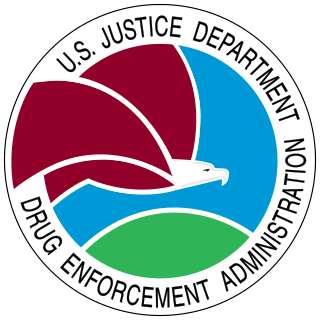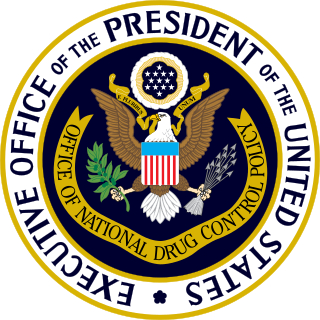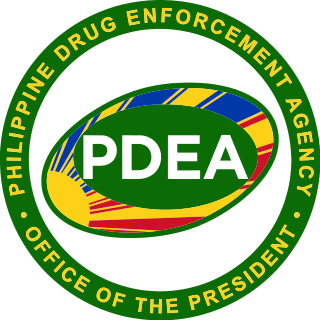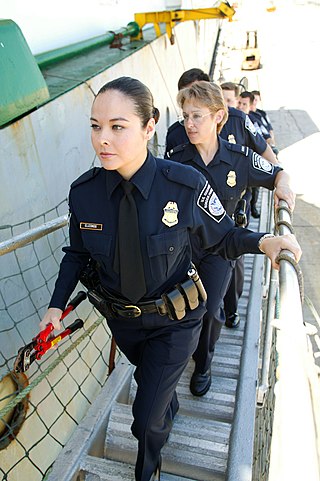
The Controlled Substances Act (CSA) is the statute establishing federal U.S. drug policy under which the manufacture, importation, possession, use, and distribution of certain substances is regulated. It was passed by the 91st United States Congress as Title II of the Comprehensive Drug Abuse Prevention and Control Act of 1970 and signed into law by President Richard Nixon. The Act also served as the national implementing legislation for the Single Convention on Narcotic Drugs.

The Drug Enforcement Administration (DEA) is a United States federal law enforcement agency under the U.S. Department of Justice tasked with combating illicit drug trafficking and distribution within the U.S. It is the lead agency for domestic enforcement of the Controlled Substances Act, sharing concurrent jurisdiction with the Federal Bureau of Investigation and U.S. Customs and Border Protection. The DEA is responsible for coordinating and pursuing U.S. drug investigations both domestically and internationally.

The Office of National Drug Control Policy (ONDCP) is a component of the Executive Office of the President of the United States.

The war on drugs is the policy of a global campaign, led by the United States federal government, of drug prohibition, foreign assistance, and military intervention, with the aim of reducing the illegal drug trade in the US. The initiative includes a set of drug policies that are intended to discourage the production, distribution, and consumption of psychoactive drugs that the participating governments, through United Nations treaties, have made illegal.

The regulation of therapeutic goods, defined as drugs and therapeutic devices, varies by jurisdiction. In some countries, such as the United States, they are regulated at the national level by a single agency. In other jurisdictions they are regulated at the state level, or at both state and national levels by various bodies, as in Australia.

The High Intensity Drug Trafficking Area (HIDTA) program is a drug-prohibition enforcement program run by the United States Office of National Drug Control Policy. It was established in 1990 after the Anti-Drug Abuse Act of 1988 was passed. The HIDTA program was made permanent through Title III of the Office of National Drug Control Policy Reauthorization Act of 2006.

The Hong Kong Customs and Excise Department is the customs service of the Hong Kong Special Administrative Region. The agency was established to protect Hong Kong from smuggling, ensure the collection of duties on taxable goods, detect and prevent drug trafficking and abuse, safeguard intellectual property rights, protect consumer interests, facilitate legitimate business and uphold Hong Kong's trade reputation, regulate money service operators and dealers in precious metals and stones, and combat money laundering and terrorist financing.

The Comprehensive Drug Abuse Prevention and Control Act of 1970, Pub. L. 91–513, 84 Stat. 1236, enacted October 27, 1970, is a United States federal law that, with subsequent modifications, requires the pharmaceutical industry to maintain physical security and strict record keeping for certain types of drugs. Controlled substances are divided into five schedules on the basis of their potential for abuse, accepted medical use, and accepted safety under medical supervision. Substances in Schedule I have a high potential for abuse, no accredited medical use, and a lack of accepted safety. From Schedules II to V, substances decrease in potential for abuse. The schedule a substance is placed in determines how it must be controlled. Prescriptions for drugs in all schedules must bear the physician's federal Drug Enforcement Administration (DEA) license number, but some drugs in Schedule V do not require a prescription. State schedules may vary from federal schedules.
Law enforcement in Malaysia is performed by numerous law enforcement agencies and primarily the responsibility of the Royal Malaysia Police. Like many federal nations, the nature of the Constitution of Malaysia mandates law and order as a subject of a state, which means that local government bodies also have a role to play in law enforcement, therefore the bulk of the policing lies with the respective states and territories of Malaysia. Below are some of the law enforcement bodies and agencies of Malaysia.

As of 2024, more than 1,280,000 sworn law enforcement officers are serving in the United States. About 137,000 of those officers work for federal law enforcement agencies.

The Organized Crime Drug Enforcement Task Force (OCDETF) is a federal drug enforcement program in the United States, overseen by the Attorney General and the Department of Justice. The principal mission of the OCDETF program is to identify, disrupt, and dismantle the major drug trafficking operations and tackle related crimes, such as money laundering, tax and weapon violations, and violent crime, and prosecute those primarily responsible for the nation's drug supply.

The Anti-Narcotics Force is a federal executive bureau and a paramilitary force of the Government of Pakistan, tasked with combating the narcotics smuggling and use within Pakistan. ANF works under the umbrella of Pakistan Army and Ministry of Narcotics Control (Pakistan) of which Mohsin Raza Naqvi is the minister since March 2024. Due to misconception on Section 4 of ANF ACT 1997, the force's head consisted of the active-duty general officer of Pakistan Army. Although the law prescribes that any competent person may be appointed as Director-General. Currently, a two-star Army Officer, Major general Abdul Moeed is deputed as Director-General. The ANF also has sole responsibility for coordinating and pursuing Pakistan narcotics investigations abroad.

The drug policy in the United States is the activity of the federal government relating to the regulation of drugs. Starting in the early 1900s, the United States government began enforcing drug policies. These policies criminalized drugs such as opium, morphine, heroin, and cocaine outside of medical use. The drug policies put into place are enforced by the Food and Drug Administration and the Drug Enforcement Administration. Classification of Drugs are defined and enforced using the Controlled Substance Act, which lists different drugs into their respective substances based on its potential of abuse and potential for medical use. Four different categories of drugs are Alcohol, Cannabis, Opioids, and Stimulants.

The Philippine Drug Enforcement Agency is the lead anti-drug law enforcement agency, responsible for preventing, investigating and combating any dangerous drugs, controlled precursors and essential chemicals within the Philippines. The agency is tasked with the enforcement of the penal and regulatory provisions of Republic Act No. 9165, otherwise known as the Comprehensive Dangerous Drugs Act of 2002.

The federal government of the United States empowers a wide range of federal law enforcement agencies to maintain law and public order related to matters affecting the country as a whole.

The Narcotics Control Bureau is an Indian central law enforcement and intelligence agency under the Ministry of Home Affairs, Government of India. The agency is tasked with combating drug trafficking and the use of illegal substances under the provisions of Narcotic Drugs and Psychotropic Substances Act.
A law enforcement agency (LEA) is any government agency responsible for law enforcement within a specific jurisdiction through the employment and deployment of law enforcement officers and their resources. The most common type of law enforcement agency is the police, but various other forms exist as well, including agencies that focus on specific legal violation, or are organized and overseen by certain authorities. They typically have various powers and legal rights to allow them to perform their duties, such as the power of arrest and the use of force.

The Federal Drug Control Service of the Russian Federation or FSKN was a federal law enforcement agency of executive authority authorized to combat illicit drug trafficking. It was responsible for drafting state policy, legal regulation, control and monitoring in combating the trafficking of drugs, psychotropic substances, and their precursors. It was commonly known as The Drugs Police (Наркополиция).

Cannabis is illegal in Nigeria, yet the country is a major source of West African-grown cannabis, and ranked the world's third highest consumer of cannabis.

Operation Kruz Control was a twelve-month, multi-agency investigation of a drug trafficking organization in southern Arizona, between December 2012 and December 2013.
















